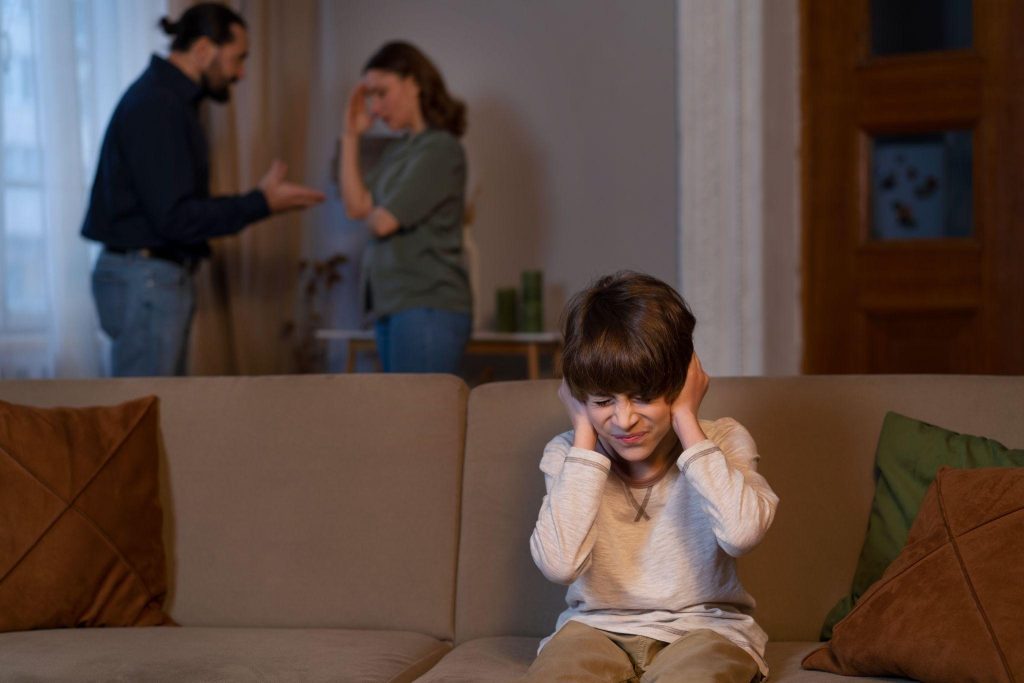PARENTAL CONFLICTS AND CHILD PSYCHOLOGY

HOW DOES PARENTAL FIGHTS AFFECT CHILDREN:
1- Emotional Distress and Anxiety:
Children exposed to parental conflicts often experience heightened levels of emotional distress. Witnessing arguments, anger, or tension between parents can make them feel insecure and frightened. Over time, this exposure may lead to chronic anxiety, as they fear the potential breakdown of the family unit. Younger children, in particular, may struggle to understand the nature of the conflict, internalizing the blame and feeling responsible for the tension. This sense of guilt further exacerbates their emotional burden, leading to low self-esteem and shame.
2- Depression and Post-traumatic stress disorder:
Prolonged exposure to parental conflicts can have severe consequences for a child’s mental health. Depression and post-traumatic stress disorder (PTSD) can result from living in a conflict-ridden household. The constant stress disrupts their ability to regulate emotions, leading to heightened vulnerability to mental health challenges throughout life. A 2023 analysis in China on 1005 children showed that interparental conflict and children's depression were positively correlated. To reduce the risk of childhood trauma , it is necessary to create a good environment and build a harmonious relationship within the family.
3- Behavioral Problems:
Parental conflicts can manifest in children through behavioral issues. They may exhibit aggression, defiance, or disruptive behaviors as a way of coping with the stress they feel. In some cases, they might withdraw socially, becoming shy or introverted due to feelings of helplessness or fear. Adolescents, on the other hand, may engage in riskier behaviors such as substance abuse, truancy, or rebellious actions as a form of escape or rebellion against the turmoil at home. A cross-sectional study was conducted among 1,368 randomly selected adolescents to analyze the effects of witnessing interparental violence. Evidence suggests that a child witnessing violence is prone to aggressive behavior as well as other psychosocial difficulties.
4- Cognitive Development and Academic Performance:
Constant exposure to parental conflict can also affect a child’s cognitive abilities and academic performance. The stress of an unstable home environment can impair concentration, memory, and decision-making skills. Children may struggle to focus in school or complete assignments due to the emotional strain they carry. Persistent worry about their parents’ arguments can overshadow their educational pursuits, resulting in declining grades or disinterest in learning.
5- Attachment and Relationships:
Parental conflicts can significantly shape a child’s future relationships. If parents model unhealthy communication patterns or exhibit hostility, children may struggle to form secure attachments. They may grow up fearing intimacy or developing mistrust toward others, often mirroring the dysfunctional dynamics in relationships. In adulthood, these children may encounter difficulties in maintaining healthy romantic relationships, as they may either replicate the conflict-driven patterns of their parents or avoid conflict altogether by suppressing their own needs.
SUPPORT STRATEGIES FOR CHILDREN IN TOXIC HOMES:
- Parents should strive to communicate respectfully and avoid arguing in front of their children.
- Seeking professional help, such as family counseling or therapy, can provide tools for managing disagreements and improving relationships.
- Parents should reassure their children of their love and stability, encouraging open conversations about feelings.
- Learning healthy conflict-resolution skills and ways to ease anxiety can also model positive behaviors for children.
- Emotional intelligence and empathy can help mitigate the impact of disagreements on a child’s mental health.
A WORD FROM MENTAL NURTURING:
Parental conflicts, whether open or hidden, can significantly impact a child's development and mental health. When parents often engage in unresolved or hostile disputes, it creates a stressful and unstable environment that can negatively shape a child's personality. These mental health issues become even more severe if conflicts escalate into verbal or physical abuse, highlighting the importance of early intervention to safeguard a child's emotional well-being and growth.
The toxic atmosphere created by parental conflicts disrupts children's emotional regulation, making it more difficult for them to process and express their feelings in a healthy way. Additionally, constant stress can negatively affect cognitive functions such as memory and concentration, which may impair academic performance. Over time, witnessing unhealthy communication and conflict patterns can shape a child's understanding of relationships, leading to challenges in forming secure attachments.
While parental conflicts can have significant adverse effects, some children may develop resilience based on their circumstances and the support they receive. Support, even from one parent, can make them self-aware and make it easier to let go of the past. Early intervention and a supportive environment are essential for helping children cope with challenges by reducing the stigma around mental health and encouraging conversations about mental health struggles.
RESOURCES:

Written by:
Rumsha Abdul Aziz, MS Psychology,
On May 26, 2025

